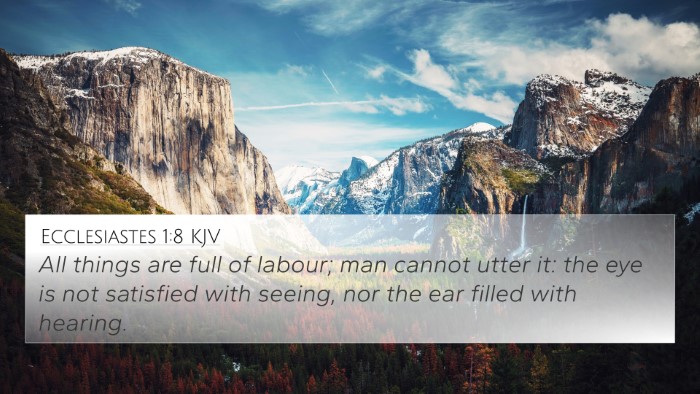Understanding Proverbs 27:20
Verse: "Hell and destruction are never full; so the eyes of man are never satisfied." (Proverbs 27:20)
Summary of Insights
This verse from Proverbs highlights the insatiable nature of human desires and the comparison of such desires to hell and destruction, which are also described as endlessly consuming. It serves as a reminder of the spiritual and moral pitfalls of unchecked ambition and greed.
Commentary Insights
- Matthew Henry: He emphasizes that just as the grave never claims all lives nor is filled to capacity, so too are human desires—forever yearning, oscillating between what one has and what one desires. This dissatisfaction leads to peril in character and spirit.
- Albert Barnes: Barnes notes that the comparison with hell and destruction signifies that men often seek fulfillment in worldly pursuits, yet this should remind them that true contentment comes not from material gain but from spiritual richness.
- Adam Clarke: Clarke elaborates on the nature of the “eyes of man” symbolizing desire, arguing that the pursuit of worldly pleasure traps individuals in a cycle of longing that never truly satisfies. He underscores that the more one possesses, the more one desires, reinforcing the futility of materialism.
Bible Verse Cross-References
Proverbs 27:20 resonates with several other passages in scripture, illustrating the theme of human desire and its consequences. Here are some notable cross-references:
- Ecclesiastes 1:8: "All things are full of weariness; a man cannot utter it: the eye is not satisfied with seeing, nor the ear filled with hearing." This verse reiterates the notion of unquenchable desire.
- James 1:14-15: "But every man is tempted, when he is drawn away of his own lust, and enticed. Then when lust hath conceived, it bringeth forth sin." This highlights the progression of desire leading to ruin.
- 1 John 2:16: "For all that is in the world, the lust of the flesh, and the lust of the eyes, and the pride of life, is not of the Father, but is of the world." This introduces an important distinction between worldly desires and desires aligned with divine purpose.
- Proverbs 21:26: "He coveteth greedily all the day long: but the righteous giveth and spareth not." It contrasts greediness against the righteousness that leads to fulfilling and lasting satisfaction.
- Matthew 5:6: "Blessed are they which do hunger and thirst after righteousness: for they shall be filled." This implies that true fulfillment comes from spiritual hunger rather than material pursuits.
- Luke 12:15: "And he said unto them, Take heed, and beware of covetousness: for a man's life consisteth not in the abundance of the things which he possesseth." It reminds believers to focus on deeper values rather than material possessions.
- Philippians 4:11-12: "Not that I speak in respect of want: for I have learned, in whatsoever state I am, therewith to be content." This speaks to finding satisfaction in the Lord instead of tangible wealth.
- Romans 1:21: "Because that, when they knew God, they glorified him not as God, neither were thankful; but became vain in their imaginations, and their foolish heart was darkened." This warns of the consequences of ignoring spiritual fulfillment.
Thematic Connections
From these references, we can draw thematic connections exploring the idea of desire and satisfaction:
- Desire's Nature: The shared message across these verses reflects human tendencies to desire endlessly, paralleling one's spiritual state with material desires.
- Spiritual vs. Material Fulfillment: Many verses emphasize that spiritual richness far surpasses material wealth, guiding believers to seek a deep, abiding satisfaction.
- Consequences of Greed: The destructive outcomes of selfish ambition and desire serve as a warning throughout the scriptures, inviting reflection on one's priorities and motivations.
Cross-Referencing Biblical Texts
Cross-referencing biblical texts can be an enlightening method for study, revealing connections between various themes and teachings:
Tools for Bible cross-referencing are invaluable for understanding how different scriptures relate to one another. This practice aids in:
- Uncovering deeper meanings.
- Augmenting sermon material.
- Supporting individual and communal studies.
By employing a Bible concordance and utilizing a cross-reference Bible study guide, seekers can navigate the intricate web of themes found throughout scripture, providing a comprehensive understanding of God's word.
Conclusion
Proverbs 27:20 serves as a profound reminder to reflect on the desires that guide our lives. By utilizing principles of cross-referencing and understanding the interconnectedness of biblical themes, believers can gain richer insights and make meaningful applications of scriptural teachings.
Practical Application
For anyone seeking to apply this understanding to their lives:
- Reflect: Consider what desires drive you and evaluate their alignment with spiritual truths.
- Study: Use available Bible reference resources to explore related themes and gain wisdom from interconnected passages.
- Pray: Seek God's guidance to cultivate a heart more attuned to His will rather than the world's insatiable desires.














